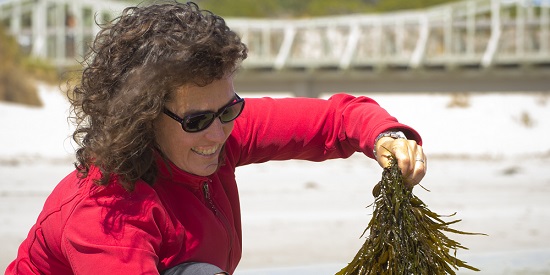Deakin scholarships: Screen addiction, dairy scaling and seaweed for cows
Deakin news
Deakin’s ground-breaking research in the areas of screen addiction, manufacturing solutions and seaweed aquaculture are set for a major boost, with the University announcing it is offering three new PhD scholarships based at Warrnambool Campus.
The scholarships will address major issues relating to public health, manufacturing and food security– investigating the social and emotional developmental impact of excess screen time on children and adolescents; engineering solutions to dairy industry equipment scaling problems; and the potential for seaweed aquaculture to combat issues in the meat and livestock sector.
Campus Director Alistair McCosh said the scholarships aligned with the University’s guiding framework for research and development of new opportunities at Deakin University’s Warrnambool Campus.
'Deakin has embarked on the development of a new sustainable model of operations for the Warrnambool Campus, which includes new course offerings and a focus on the strategic use of campus facilities,' Mr McCosh said.
'Importantly, these new scholarship opportunities for 2019 will go towards ensuring the Warrnambool Campus is delivering on the University’s mission of undertaking research that makes a difference to the communities we serve.
'Successful candidates will also be offered re-location assistance and short term accommodation support if required, to help them get settled in and become part of the Warrnambool community.'
The School of Psychology’s Dr Sharon Horwood, who will lead the supervisory team for the screen addiction study, said the research project aimed to engage with primary and secondary schools across Warrnambool and the south-west region.
'There is emerging evidence that excessive screen use may have negative impacts on children and adolescents, particularly with respect to poor sleep, behavioural issues, reduced physical activity, and increased exposure to online bullying,' Dr Horwood said.
'However, there are many questions still to consider. This research project aims to understand the social and emotional implications of excessive screen time, as well as develop evidence-based guidelines and public health messaging aimed at empowering young people, and their parents, to better manage their own technology use.'
The School of Life and Environmental Sciences’ Dr Alecia Bellgrove, who will be leading the supervisory team for the seaweed study, said the project would allow for close collaboration with the south-west region’s famous dairy and livestock sector.
'Global demand for seaweed has increased dramatically over recent decades and people are beginning to recognise the potential for seaweed aquaculture to address issues around food security and climate change mitigation,' Dr Bellgrove said.
'Working with key industry partners in the south-west region’s meat and livestock sector, the focus of this project will be to see if we can enhance milk yield and quality, as well as improve cow health, by gradually supplementing their diet with seaweed.
'This change in diet could also lead to a cheaper, more reliable animal feed source and a subsequent reduction in methane emissions.'
The final PhD scholarship will address challenges within the dairy industry, and will be directed toward finding solutions to chemical scaling.
Scaling occurs during milk processing, when the plant temperature and chemistry conditions cause dissolved mineral salts to precipitate and form solid deposits on plant equipment.
Scale formation is a major issue for milk processing plants, leading to increased operating costs and reductions in overall plant productivity.
Mr McCosh said the new project would harness expertise from the University’s School of Engineering to understand, characterise and develop cost-effective solutions to scaling in dairy factories.
'This scholarship is perfectly suited for Deakin’s Warrnambool Campus, as we’re in the heart of south-west Victoria’s dairy region – one of three major dairy regions in a state that accounts for 79 per cent of Australia’s overall dairy exports,' he said.
'The results could have broad applications across the international dairy and food manufacturing sector, and there is potential for the scholarship recipient to work collaboratively with a range of industry partners.'
Share this story

